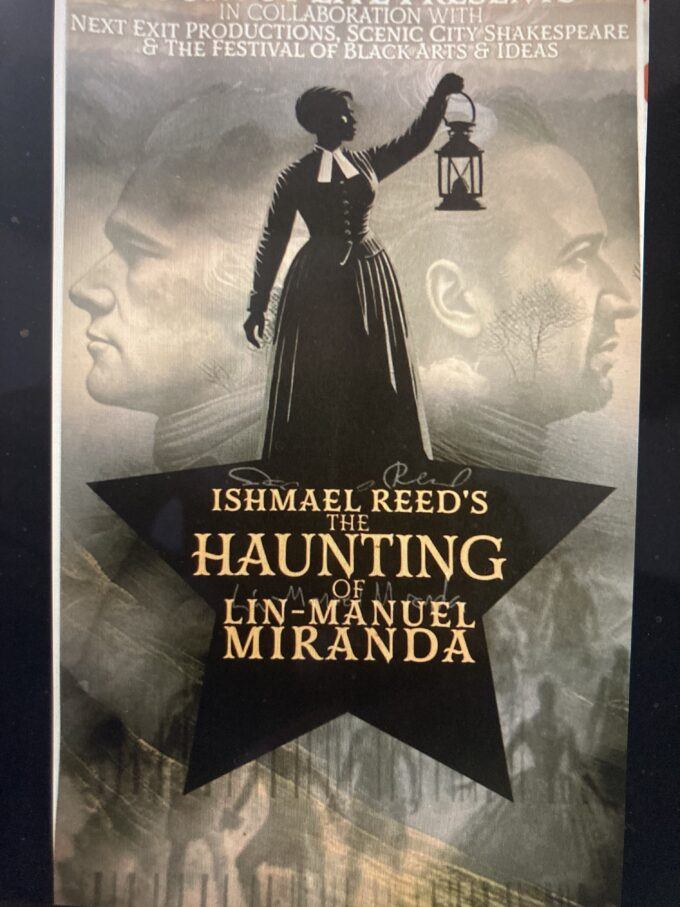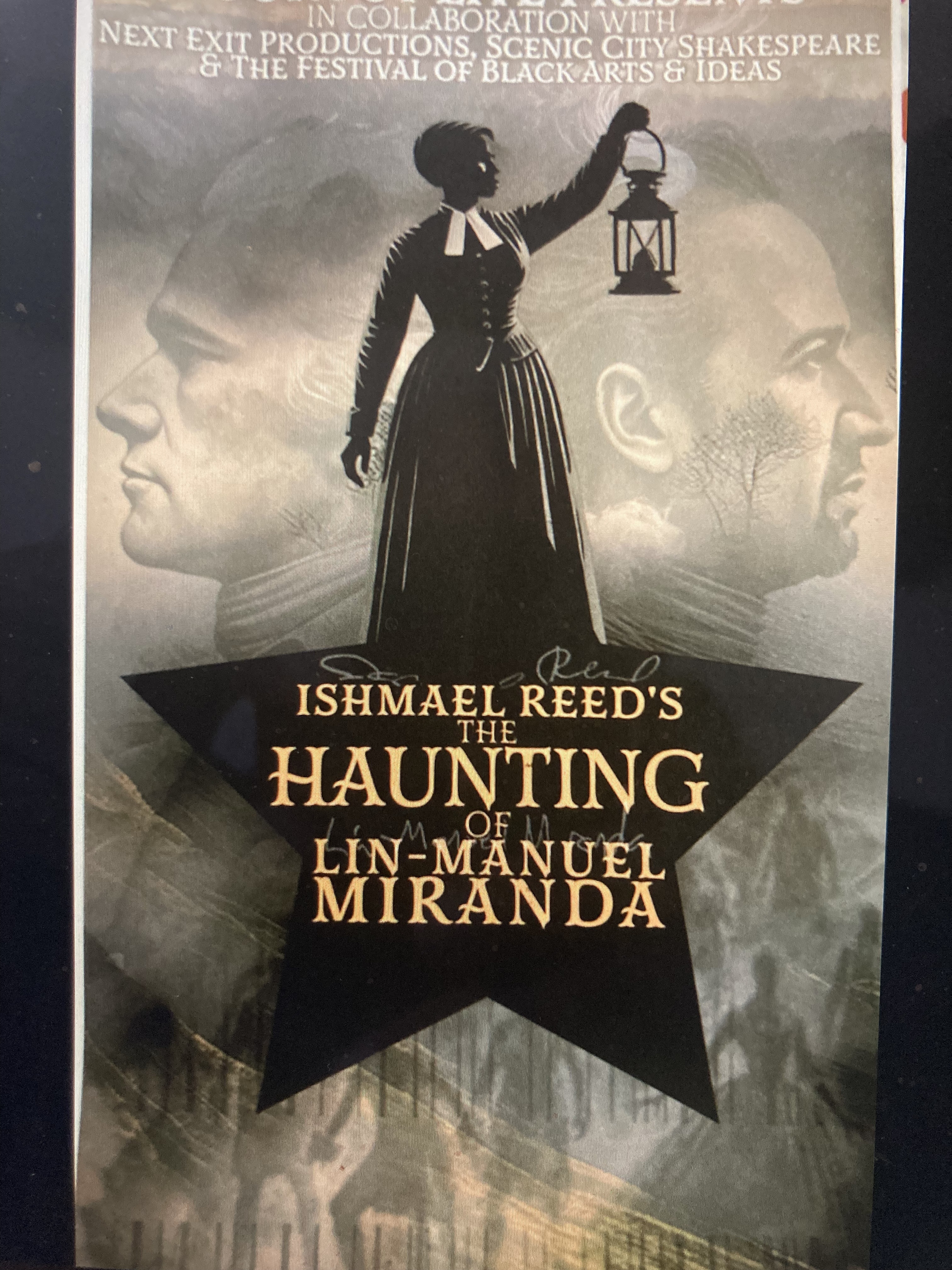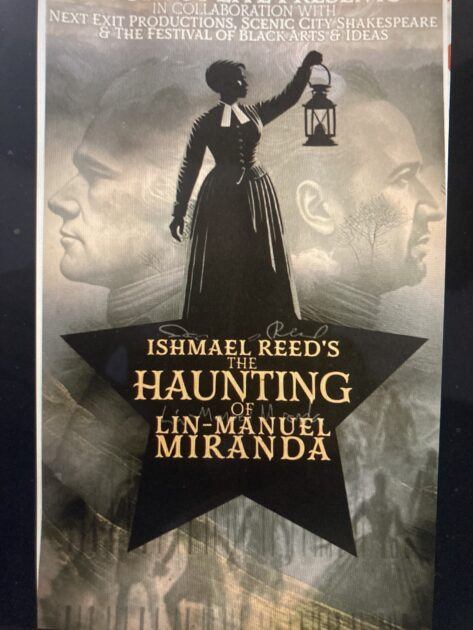






























































Since the reading of my play “The Haunting of Lin-Manuel Miranda” in January 2019, which was preceded by a CounterPunch essay, to now, my play has been haunting the multi-billion dollar musical that honors slave traffickers. So when “Hamilton” was performed in New Zealand, “The Haunting…” was also featured. The same thing is happening in Chattanooga this weekend. As the corporate networks, ABC and CBS, blue-ribbon law firms, and universities yield to Tyranny, we can still get in our licks at the Oligarchy and their founding fathers on the cheap using the Off-Off Broadway stage.
– IR
The creation of “The Haunting of Lin-Manuel Miranda” occurred accidentally. A 1981 film I co-produced, “Personal Problems,” was to be shown at the National Gallery in Washington, D.C. Because of the Covid outbreak, it was canceled. I had planned to go from New York to Washington by Amtrak, which gave me a refund. Still, it was too late to cancel hotel and airline reservations for my daughter and my spouse, Carla Blank, who has directed many of my plays in the United States and one of my plays in China, besides directing a play in Ramallah and collaborating with such theater luminaries as Robert Wilson, director of the five-act work, “the CIVIL warS.
I told Rome Neal, who has directed my plays since the 1990s that I’d been working on a script about Lin-Manuel Miranda’s musical “Hamilton,” in which the founding fathers and Hamilton’s father-in-law, General Philip Schuyler, and his daughters were played by minority actors. Though Miranda and historian Ron Chernow, author of the biography “Alexander Hamilton,” his acknowledged source for the content of the “Hamilton” musical, cast Hamilton as someone who was concerned about the oppressed, Hamilton was involved in slave trafficking all of his life from the time of his youth in the Caribbean when he inherited slaves and had a job grooming Africans for resale, to the time that he owned and sold slaves as a resident of New York.
Ironically, inaugural poet Amanda Gorman would praise “Hamilton” and announce that she referred to the musical in her inaugural poem. When my criticism of the play was repeated during her Vogue magazine interview, she said Ishmael is “intense.” A critic of the play, Lyra Monteiro, was among those who pointed to Hamilton’s sale of a Black woman and her child for over 200 dollars. He left receipts!
Despite Miranda’s attempt to depict the Schuyler sisters as progressive feminists, they grew up in a household where slaves received cruel treatment, according to an examination of their remains by a forensic team. The usual excuse for the sisters, like the plantation mistresses of the South, is that they didn’t know what was happening. In his play, “The Escape; Or, a Leap for Freedom,” written in 1855 by William Wells Brown, a fugitive slave, the mistress of the plantation household, Mrs. Gaines, could use the cowhide against the enslaved as vigorously as the master of the house, who was bedding down as many enslaved women that were available. Indeed, some white women in the South engaged in slave trafficking themselves, according to Stephanie E. Jones-Rogers. But by contrast, I’m waiting for someone to make a film about the Richmond Bread Riots (March 1863), when one thousand armed white women rose against the Confederate army only to be threatened with a massacre by Jefferson Davis. These and other stories fall through the cracks of the American curriculum, where everything is made heroic, noble, and admirable. That’s where the playwright, the poet, and the novelist come in. The stage since ancient times is where a writer can tackle issues of the day and respond to the official version of reality handed down by the state or the Oligarchy. Off-off-Broadway theater doesn’t require the millions of dollars to make a film.
However, there came a backlash against my play, from the initial reading of the play to the full production at the Nuyorican Poets Cafe, with angry letters and comments in The New York Times, Broadway World, Vice News, and even NPR’s “Wait Wait Don’t Tell Me.” I received a fair hearing on “The View.” “The New York Times finally printed the smoking gun on November 11, 2020:
Alexander Hamilton, Enslaver? New Research Says Yes
“A paper by a researcher at the Schuyler Mansion finds overlooked evidence in letters and Hamilton’s own account books indicating that he bought, sold and personally owned slaves.”
Miranda’s reply to my criticisms and those of others was weak. In a tweet, he wrote that he had such a task in treating complex that he didn’t have the room to include Hamilton’s history as a slave trafficker because it would have challenged the premise upon which the musical was based, the fib that Hamilton was an abolitionist? Or that the Schuyler sisters were feminists. He said @Lin_Manuel:
“All the criticisms are valid. The sheer tonnage of complexities & failings of these people I couldn’t get. Or wrestled with but cut. I took 6 years and fit as much as I could in a 2.5 hour musical. Did my best. It’s all fair game.”
This is like adapting Melville’s Moby Dick and omitting the whale. The whale, in this case, was the reputation of Hamilton as a slave trafficker.
Though “Hamilton” has become part of the American school curriculum, Miranda didn’t receive a rapturous reception at the University of Puerto Rico when it was performed in San Juan in 2019. The students asked why Miranda created a musical about Hamilton, whom they called an Imperialist, and not about Harriet Tubman, whose picture he kept off the twenty-dollar bill. These students must have read Hamilton’s position on the Haitian slave revolt. The reputed abolitionist Hamilton sided with the French slaveholders.
Three women historians, Lyra Monteiro, Nancy Isenberg, and Michelle DuRoss, exposed the myth of Hamilton as an abolitionist. I merely staged their ideas and those of others.
Dr. Lyra D. Monteiro noted that three minority actors play white, slave-owning current or future presidents — obscuring “the white supremacist origins of our country.” “It’s a musical about the mythology of the ruling class — that anybody can join it,” said the Rutgers professor.
Historian Nancy Isenberg wrote: “Miranda went further than Chernow in trying to reshape Hamilton into a progressive to celebrate President Barack Obama, portraying the Founding Father into someone hip and multicultural.” She notes he once bought two enslaved people for $250. “Imagine if one of the songs in the musical was ‘$250,’” she said. “This would make everyone in the audience squirm and scream and completely undermine the heroic message and the progressive Hamilton that they want and crave.”
Michele DuRoss, a professor at the University at Albany, State University of New York, wrote: “Alexander Hamilton’s biographers praise Hamilton for being an abolitionist, but they have overstated Hamilton’s stance on slavery.” Historian John C. Miller insisted, “He [Hamilton] advocated one of the most daring invasions of property rights that was ever made– the abolition of Negro slavery.[1] Biographer Forest McDonald maintained, “Hamilton was an abolitionist, and on that subject, he never wavered.” [2] Hamilton’s position on slavery is more complex than his biographers suggest. Hamilton was not an advocate of slavery, but when the issue of slavery came into conflict with his ambitions, his belief in property rights, or his belief of what would promote America’s interests, Hamilton chose those goals over opposing slavery….During the eighteenth century, a large number of upper-class Americans held enslaved people. When Hamilton had to make a choice between his social ambitions and his desire to free slaves, he opted to follow his ambitions.” Professor Joanne Freeman of Yale defended the musical. She and some other academics who defended “Hamilton” were on the Hamilton payroll. I asked her how much she was paid. She never answered.
For Hamilton, Black slaves were in the same category as farm animals. He accused the British of “stealing negroes from their owners.” His attitudes toward Native Americans were worse. In one letter, he celebrated the massacre of Native Americans. But like the Christians who wish to end the safety net for the needy, he and his father-in-law, Phillip Schuyler, were hypocrites. They were even members of the New York Manumission Society, which his father founded, while the old man hunted down fugitive slaves.
Isenberg, DuRoss, and Monteiro are courageous women. They join Native American, Hispanic, and Black historians like the late Lerone Bennett Jr. in challenging the good old boy and girls’ Historical establishment.
Miranda, a sympathetic character in my play who was misled by a curriculum like the rest of us, says that his “Hamilton,” a billion-dollar property, is relevant to these times. He has a point. Hamilton wanted an elected king to rule. When that king died, another king would rule the government we have now, where the president says he rules not only the United States but also the world. Well, an Emperor.
The brave Lookout Players, the multicultural historians, the artists, playwrights, and novelists who challenge the country’s official history are like Tom Witzky, played by Kevin Bacon, in the 1999 film “Stir of Echoes,” in which Witzky insists that there is a corpse behind a basement wall. Nobody believed him, but he was right. He was telling the truth.
Those who wish to coast along with a make-believe version of history that has created generation after generation of bigots are standing between the new historians and that wall behind which there is an ugly entity that must be exposed to tell the truth of our history.
The Gospel of John, Chapter 8, Verse 32 says: “And ye shall know the truth, and the truth shall make you free.”
The post We Continue to Haunt Hamilton appeared first on CounterPunch.org.
This post was originally published on CounterPunch.org.